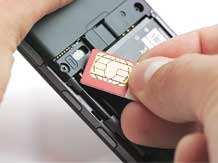The Ministry of communications has introduced new reforms for SIM card point-of-sale (PoS) in an effort to enhance the protection of mobile users. This includes licence requirements and complete KYC of end-users for business connections. The ministry has also discontinued the bulk connection mechanism.
The announcement was made on Thursday by the ministry. Communication minister Ashwini Vaishnaw told the media in a briefing that steps have been taken to check the practice of cyber frauds and spam calls and protect the users.
These reforms are in line with the “Sanchar Saathi” portal, which was set up to fight against cybercrimes and financial fraud.
Point-of-sale registration
The PoS registration reform mandates the compulsory registration of franchisees, agents, and distributors (PoS) by licensees. The aim is to weed out rogue PoS who engage in fraudulent practices by issuing SIM cards to antisocial or anti-national elements.
This reform involves rigorous verification of PoS by Licensees, backed by a written agreement between the two parties.
Any PoS found engaging in illegal activities faces termination and blacklisting for a period of three years. Existing PoS will be registered under this process by licensees within a span of 12 months.
KYC reforms
KYC (Know Your Customer) is a process that uniquely identifies customers before they receive telecom services. According to the new reforms, facial-based biometric authentication will be permitted in addition to the thumb and iris-based biometric authentication. Complete KYC will also be required in cases where SIMs are swapped or replaced, with a 24-hour bar on outgoing and incoming SMS facilities.
To combat the misuse of printed Aadhaar, demographic details will be captured by scanning the QR code on the printed Aadhaar.
Moreover, disconnected mobile numbers won’t be allocated to new customers for 90 days.
In addition to thumb impressions and iris-based authentication in Aadhaar E-KYC, facial-based biometric authentication is now an option.
Business connections for entities
The ministry has introduced “business connections”, catering to entities like companies, organisations, trusts, and societies. Under this, businesses can obtain multiple mobile connections by completing KYC for all end-users. Activation of SIMs hinges on successful KYC for end-users and physical verification of the entity’s premises/address.
Why have these new reforms and steps been taken?
The “Sanchar Saathi” portal, launched on World Telecommunication Day, has played a pivotal role in reporting fraudulent connections, registering stolen or lost mobile sets, and informing subscribers of all the connections registered under their names. Through the analysis of 1.14 billion active mobile connections in the country, the ministry has identified more than 6.6 million suspected mobile connections and disconnected more than 5.2 million non-verified connections.
The ministry has also blacklisted over 67,000 PoS and registered over 300 FIRs against rogue PoS. Around 800,000 bank/wallet accounts found to be connected to fraudsters have been frozen.
Additionally, 17,000 mobile handsets and 66,000 WhatsApp accounts have been blocked so far.
As digitisation sweeps across India, telecom resources, particularly mobile services, play a pivotal role in accessing online services. The data procured by the ministry demonstrated the magnitude of fraudulent and criminal behaviour in the sector, resulting in the need to create reforms to better protect mobile users.
Note:- (Not all news on the site expresses the point of view of the site, but we transmit this news automatically and translate it through programmatic technology on the site and not from a human editor. The content is auto-generated from a syndicated feed.))



